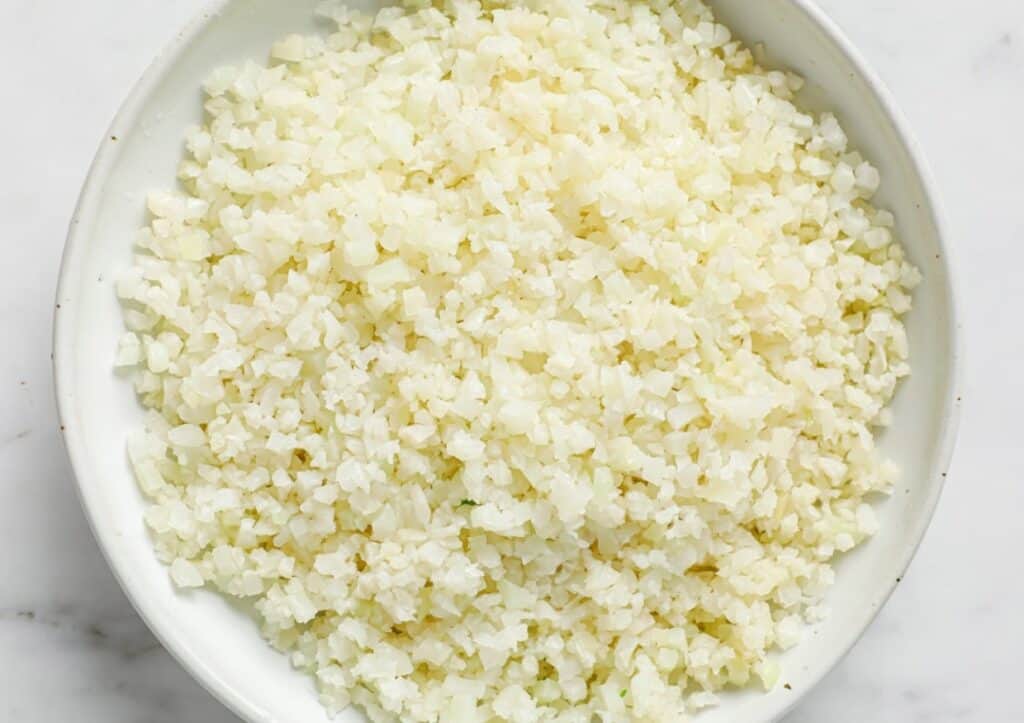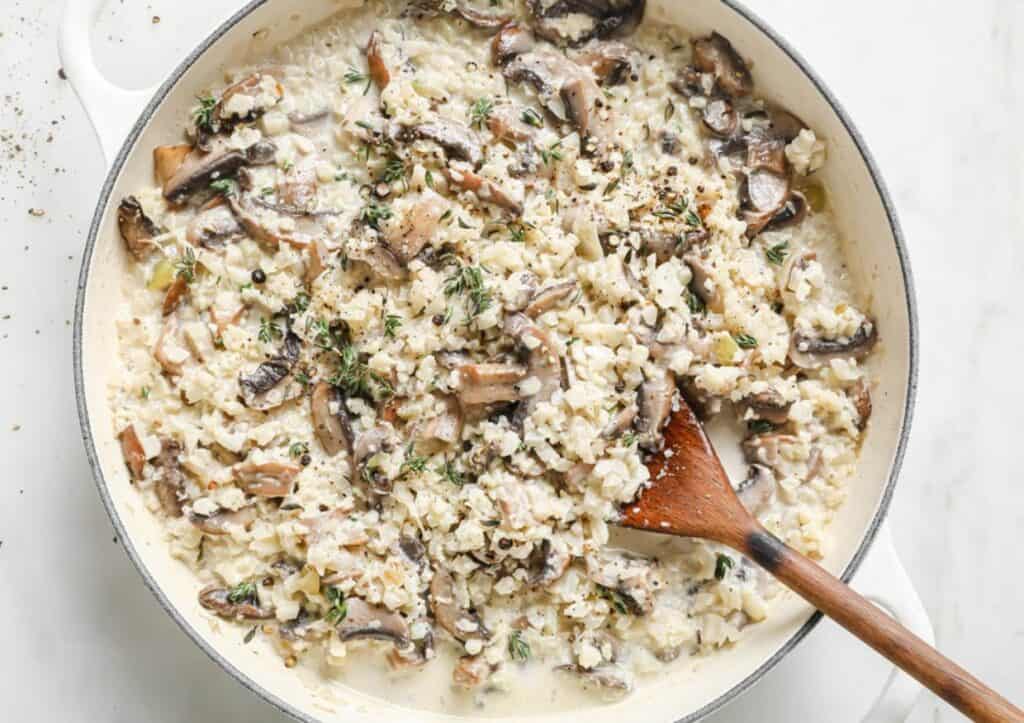Frozen cauliflower rice is a healthy and convenient option for those looking for a quick and easy way to add more vegetables to their diet. It is simply raw cauliflower that has been processed into small, rice-like pieces and then frozen.

You may have purchased frozen cauliflower rice because it’s budget-friendly, has a longer shelf life than fresh cauliflower, and stores well. But months have passed, and now you have no idea how to use it.
Here are a few reasons why you should pull that frozen cauliflower rice out of your freezer:
- Convenience: Frozen cauliflower rice is highly convenient since it is pre-cut and ready to use straight out of the bag. It saves you the time and effort of chopping a head of cauliflower yourself.
- Nutritious: Cauliflower is a nutrient-dense vegetable that is low in calories but high in fiber, vitamins, and minerals. It is an excellent source of vitamin C, vitamin K, folate, and potassium. Cauliflower is also a good source of fiber, which can help keep you feeling full and satisfied. Fiber can also help regulate digestion. Replacing traditional rice with cauliflower rice can help you increase your vegetable intake and reduce your calorie intake at the same time.
- Low-carb: Frozen cauliflower rice is an ideal choice if you’re looking for a low-carb or keto alternative to traditional rice. It’s lower in calories and carbohydrates than rice and packed with vitamins and minerals.
- Versatile: Frozen cauliflower rice is incredibly versatile. You can use it as a base for stir-fries, a substitute for sushi rolls, or a low-carb alternative to traditional rice in bowls and salads.
“I love to keep a bag of frozen cauliflower rice in my freezer for times I want a quick low-carb alternative to the rice my family is having for dinner. It’s so easy to heat it up while I’m cooking the rest of the dinner, and it really is a great stand-in for regular rice as far as pairing well with a lot of different flavors and serving as a base for saucy dishes.”
— Robin Donovan, All Ways Delicious
How To Cook Frozen Cauliflower Rice
Microwave Method (Non-Steamable):
- Remove the frozen cauliflower rice from the freezer and place it into a microwave-safe dish.
- Cover the dish with a microwave-safe lid or plastic wrap, leaving a small vent to allow steam to escape.
- Microwave on high for four to six minutes, stirring halfway through, until the cauliflower rice is heated through and tender.
- Let it sit for one to two minutes before removing it from the microwave.
Microwave Method (Steamable):
- Place the unopened bag of steamable frozen cauliflower rice in the microwave.
- Make sure that the bag is placed in the proper position so that it can vent while cooking by following the instructions on the packaging.
- Microwave the bag for the time listed on the packaging, for instance, on high for five to six minutes.
- Carefully remove the bag from the microwave (it will be hot) and let it cool for at least one minute before carefully cutting it open with scissors.
Stovetop Method:
- Heat a non-stick skillet over medium-high heat.
- Add a small amount of olive oil to the pan and allow it to heat up.
- Add the frozen cauliflower rice to the skillet and stir to combine. You may need to add some water to the pan (check the packaging to confirm).
- Cook for five to seven minutes, stirring occasionally, until the cauliflower rice is tender and heated through before removing it from the heat.
Note: The cooking time may vary depending on the brand and amount of frozen cauliflower rice you use. Referring to the package instructions for cooking times and temperatures is always a good idea.
Filled with appetizers, salads, sides, mains and desserts, Food Drink Life's cookbook will become your favorite!
- Easy and delicious recipes from a variety of top chefs and recipe developers.
- Bright, colorful pictures on every page.
- Printer-friendly recipes that you can download instantly to your device.
- Printable shopping list and a kitchen conversion sheet.
Do You Have to Wash Frozen Cauliflower Rice?
No, you do not have to wash frozen cauliflower rice before cooking it (and likely should not wash it first). Frozen cauliflower rice has already been processed and cleaned before it was frozen, and most brands require that you cook the frozen cauliflower rice right from its frozen state.
Is Frozen Cauliflower Already Cooked?
Usually, frozen cauliflower rice still needs to be fully cooked. It is typically only blanched before being frozen, which helps preserve its quality and nutrients.
The cauliflower rice is briefly boiled or steamed to cook partially and then quickly cooled to stop the cooking process. This blanching helps preserve the cauliflower’s color, texture, and flavor while also reducing the growth of harmful bacteria.
Should I Thaw Frozen Cauliflower Rice Before Cooking?
Most store-bought brands of frozen cauliflower rice should not be thawed before cooking and should be cooked straight from frozen.
How Do You Make Frozen Cauliflower Rice Not Soggy?
Cook it in small batches: If you’re cooking it on the stovetop, cook the frozen cauliflower rice in small batches. Cooking too much at once can produce excess moisture and lead to soggy cauliflower rice.
Don’t overcook it: Overcooking cauliflower rice can also lead to a soggy texture. Follow the instructions on the package and cook the cauliflower rice only until it’s tender, yet still has some texture.
Use high heat: When cooking cauliflower rice on the stovetop, use high heat for cooking it quickly and evaporating any excess moisture. The high heat will help keep the cauliflower rice from becoming too soft and soggy.
Why Has My Frozen Cauliflower Rice Turned Grey?
Natural discoloration: Over time, frozen cauliflower rice can naturally start to lose its bright white color and turn a slightly greyish color. This loss of color is due to natural oxidation, which can happen when the cauliflower is exposed to air.
Freezer burn: If the cauliflower rice has been in the freezer for an extended period or wasn’t stored correctly, it can develop freezer burn. Freezer burn occurs when the food’s surface becomes dehydrated, and ice crystals form, which can cause the cauliflower to turn grey and create a tough texture.
Spoilage: If the cauliflower rice has been in the freezer for too long, it may spoil and develop mold or other bacteria that can cause it to turn grey, have a foul odor, and have a slimy texture.
Frozen cauliflower rice can spoil like any other food, so follow proper food storage and handling practices. If the cauliflower rice looks or smells off, it’s best to discard it to avoid the risk of foodborne illness.

What Is The Shelf Life of Frozen Cauliflower Rice?
Generally, frozen cauliflower rice can last between eight to twelve months when stored at zero degrees Fahrenheit or below.
Though, it’s important to note that the quality of pre-packaged frozen cauliflower rice may deteriorate after several months in the freezer. It may lose some of its flavor and texture the longer it’s frozen. To ensure the highest quality, use frozen cauliflower rice within three to six months of purchasing.
Always follow proper food storage and handling practices to maximize shelf life. If you notice any signs of spoilage, such as discoloration, off odor, or sliminess, discard the cauliflower rice to avoid the risk of foodborne illness.
Ways To Use Frozen Cauliflower Rice
Cauliflower Fried Rice: Use frozen cauliflower rice as a base for a healthier version of this popular takeout dish.
Cauliflower Rice Bowl: Top the cauliflower rice with your favorite protein, veggies, and sauce for a delicious and nutritious meal, like this Meal Prep Saucy Salmon.
Cauliflower Rice Sushi Roll: Use cauliflower rice as a substitute for traditional sushi rice to make a healthier sushi roll.
Cauliflower Rice Mash: Cook the cauliflower rice from frozen, pour it into a food processor with some heavy cream, butter, and seasonings, and pulse until smooth and creamy to yield a lower-carb alternative to mashed potatoes.
Cauliflower Rice Soup: Use cauliflower rice as a creamy and flavorful soup base.
Cauliflower Rice Stir Fry: Toss cauliflower rice with your favorite veggies, protein, and sauce for a quick and easy stir fry.
Cauliflower Rice Salad: Mix the cauliflower rice with fresh herbs, cooked vegetables, a protein, like chicken or salmon, and a dressing for a refreshing salad.
Cauliflower Rice Tacos: Use cauliflower rice as a filling for tacos, along with your favorite toppings.
Cauliflower Rice Stuffed Peppers: Stuff bell peppers with cauliflower rice, protein, and cheese for a tasty, low-carb meal.
Cauliflower Rice Risotto: Use cauliflower rice instead of traditional arborio rice to make a creamy and delicious cauliflower risotto.
Cauliflower Rice Casserole: Prepare your frozen cauliflower rice with cheese and protein like this cheesy beef casserole for a filling dinner.

Cauliflower Rice Breakfast Bowl: Top the cauliflower rice with eggs, bacon, avocado, and salsa for a filling and delicious breakfast.
Cauliflower Rice Burrito Bowl: Use the cauliflower rice as a base for a burrito bowl, along with your favorite toppings.
Cauliflower Rice Sushi Bowls: Mix the cauliflower rice with avocado, cucumber, soy sauce, and your favorite sushi toppings for a quick and healthy sushi bowl.
Cauliflower Rice Shepherd’s Pie: Layer the cauliflower rice with ground beef, veggies, and mashed potatoes for a hearty and delicious shepherd’s pie.
Cauliflower Rice Burritos: Use cauliflower rice as a filling for burritos, along with beans, cheese, and salsa.
Cauliflower Rice Falafel: Mix the cauliflower rice with chickpeas, herbs, and spices to make a tasty and healthy falafel.
Cauliflower Rice Pilaf: Cook cauliflower rice with spices, raisins, and almonds for a flavorful and fragrant pilaf.
Final Thoughts
Frozen cauliflower rice is a healthy and convenient option for busy people who want to eat healthily. It is a great way to increase your vegetable intake and reduce your calorie intake at the same time while also saving you time and effort in the kitchen.
So, open up your freezer, pull out that bag of frozen cauliflower rice, cook it up, and dig in.
Sara Nelson is the food blogger behind Real Balanced, a site that shares easy and balanced recipes. Since 2017, she has shared delicious, nutritious, and allergy-friendly recipes with thousands of blog readers and social media followers. Sara lives in Wisconsin with her husband, two children, and their dog.
